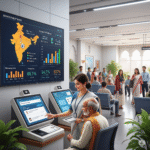“A Tapestry of Harmony: How India’s Democracy Thrives Amidst Diversity”
India, a nation of 1.4 billion people, is a living testament to the concept of“unity in diversity.”With its array of languages, religions, cultures, and ethnicities, India’s pluralistic democracy has flourished against the odds, becoming a model of how diversity can be a strength rather than a challenge. The nation’s ability to integrate its myriad identities into a unified democratic framework has been instrumental in shaping its success and resilience.
Diversity as India’s Strength
- Cultural and Linguistic Pluralism
- India is home to 22 officially recognized languages and over 19,500 dialects. The Constitution’s Eighth Schedule acknowledges linguistic diversity while uniting citizens under a shared national identity.
- Religious diversity is equally profound, with Hinduism, Islam, Christianity, Sikhism, Buddhism, and Jainism among the major faiths practiced. The secular nature of the Indian state ensures freedom of religion and equal respect for all beliefs.
- Federal Structure for Representation
- India’s federal system provides autonomy to its 28 states and 8 Union Territories, enabling local governance while ensuring national cohesion. This balance allows for diverse regional aspirations to coexist within a unified democratic framework.
Key Metrics of Democratic Integration
- Electoral Inclusivity
- India’s elections are a global marvel of participation. In the 2019 Lok Sabha elections, 67.1% of eligible voters cast their votes, representing diverse demographics. Women accounted for nearly 48% of the electorate, reflecting a narrowing gender gap in political participation.
- The reservation of parliamentary and legislative assembly seats for Scheduled Castes (SC) and Scheduled Tribes (ST) ensures that historically marginalized communities have a voice in governance. In 2024, 131 seats in the Lok Sabha are reserved for SCs and STs.
- Grassroots Representation
- The Panchayati Raj system has empowered over 3 million local representatives, including a significant number of women, to govern at the village level. This decentralization brings democracy closer to the people, fostering participation across all sections of society.
- Social Harmony Metrics
- According to the 2023 National Survey on Social Cohesion, 72% of Indians believe that diversity strengthens national unity. This sentiment underscores the broad public acceptance of India’s pluralistic ethos.
Challenges to Unity in Diversity
- Religious and Cultural Tensions
- Periodic communal tensions and polarization challenge India’s secular fabric. Addressing these issues requires consistent efforts to foster interfaith dialogue and uphold constitutional safeguards for all communities.
- Regional Disparities
- Economic and developmental gaps between states create tensions that can strain national unity. States like Kerala and Gujarat enjoy higher Human Development Index (HDI) rankings, while others, like Bihar and Uttar Pradesh, lag behind. Addressing these disparities is essential for equitable progress.
- Political Fragmentation
- The presence of regional parties, while reflective of India’s diversity, sometimes leads to coalition instability at the national level. Balancing regional aspirations with national interests remains a complex challenge.
Strategies for Sustained Unity
- Educational Reforms
- Emphasizing India’s pluralistic heritage in school curricula can foster understanding and respect among young citizens. Promoting cultural exchange programs among states can also enhance inter-regional awareness.
- Economic Inclusion
- Equitable economic development through programs like MGNREGA and Skill India ensures that no community or region feels left behind, reducing potential sources of division.
- Promoting Dialogue
- Platforms for interfaith and intercultural dialogue, supported by government and civil society initiatives, can strengthen trust among communities and reinforce the principles of secularism.
Conclusion: A Living Example of Pluralistic Democracy
India’s democratic success is rooted in its ability to transform diversity into a unifying force. The principle of“unity in diversity”is not just a slogan but a lived reality for millions, exemplified through the country’s political structure, social interactions, and cultural fabric.
As India continues its journey as a global power, nurturing this cornerstone of democracy will remain critical. By celebrating its differences while upholding shared values of equality, justice, and freedom, India sets an inspiring example of how diversity can serve as the foundation for democratic strength.










